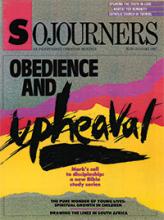The last months of 1986 saw a steady stream of seemingly positive headlines related to South Africa. The U.S. Congress passed a sanctions bill and overrode the president's veto. IBM, General Motors, and Coca-Cola all announced that they were selling off their assets in South Africa and pulling out of the country. And the quadrennial synod of the white Dutch Reformed Church in South Africa passed resolutions that seemed to indicate a turn away from the church's historic support for the apartheid system.
In the world according to the U.S. media, it would almost be possible to enter 1987 believing that the tide has turned in South Africa and the prospect of real change is at hand. Unfortunately that perception tells us more about the limitations of our media-oriented worldview than it does about the political realities of South Africa. The tendency is to force events into our media time line, which sees only the melodrama of the moment and is incapable of taking in the broader, slower, and inevitably messier drama of a struggle that is already generations old.
Another peculiarly American obstacle to our perception of South Africa is our tendency to vastly overrate the significance of our own initiatives, like sanctions, as instant solutions for other people's problems. But perhaps the most dangerous of all American misperceptions of South Africa is the tendency to impose the assumptions of our history and our political process onto what is sometimes called the "process of change" there. This can cause us to set up all kinds of categories--"moderation" vs. "extremism"; "communist" vs. "anti-communist"; "violent revolutionaries" vs. "responsible critics"--that are totally irrelevant to South African reality. And as a result, we can totally misperceive the nature of "reform" in the South African context.
Read the Full Article

